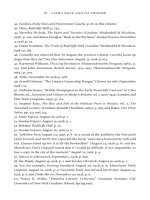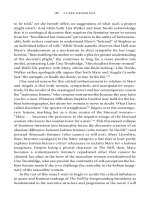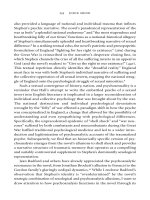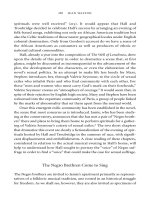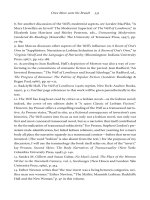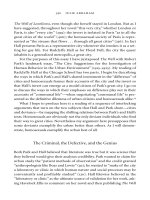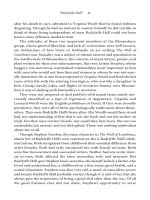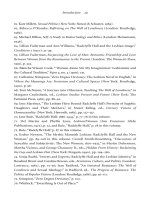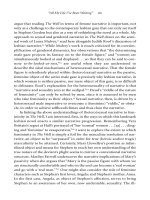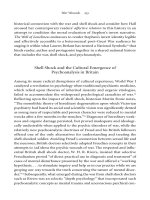Palatable poison 249
Bạn đang xem bản rút gọn của tài liệu. Xem và tải ngay bản đầy đủ của tài liệu tại đây (25.33 KB, 1 trang )
234
jodie medd
also provided a language of national and individual trauma that inflects
Stephen’s psychic narrative. The novel’s paradoxical representation of the
war as both “a splendid national endeavour” and “the most stupendous and
heartbreaking folly of our times” functions as a national-historical allegory
of Stephen’s simultaneously splendid and heartbreaking narrative of sexual
difference.8 In a striking textual echo, the novel’s patriotic and prosopopeitic
formulation of England “fighting for her right to existence” (269) during
the Great War is reinscribed in the narrative’s desperate closing line, in
which Stephen channels the cries of all the suffering inverts in an appeal to
God (and the novel’s readers) to “Give us the right to our existence!” (447).
This textual repetition directly identifies the “dreadful reality” England
must face in war with both Stephen’s individual narrative of suffering and
the collective oppression of all sexual inverts, mapping the national struggle of England onto the psychological struggle of sexual minorities.9
Such a textual convergence of history, nation, and psychosexuality is a
reminder that Hall’s attempt to write the embattled psyche of a sexual
invert into English literature is implicated in a larger reconsideration of
individual and collective psychology that was brought about by the war.
The national destruction and individual psychological devastation
wrought by the “folly” of war effected a paradigm shift in how the psyche
was conceptualized in England, a change that allowed for the possibility of
understanding and even sympathizing with psychological differences.
Specifically, the unprecedented epidemic of “shell shock” and “war neuroses” suffered by both combatants and noncombatants during the Great
War baffled traditional psychological medicine and led to a wider introduction and legitimization of psychoanalytic accounts of the traumatized
psyche. Subsequently, we find that an historically specific version of psychoanalysis emerges from the novel’s allusions to shell shock and provides
a narrative structure of traumatic memory that operates as a compelling
and suitably controversial supplement to Stephen’s dominantly sexological
representation.
Jean Radford and others have already appreciated the psychoanalytic
resonances in the novel, from Jonathan Brockett’s allusion to Ferenczi to the
Gordon family’s glaringly oedipal dynamics.10 While I endorse Radford’s
observation that Stephen’s identity is “overdetermined” by the novel’s
strategic combination of sexological and psychoanalytic allusions, I want to
draw attention to how psychoanalysis functions in the novel through its
